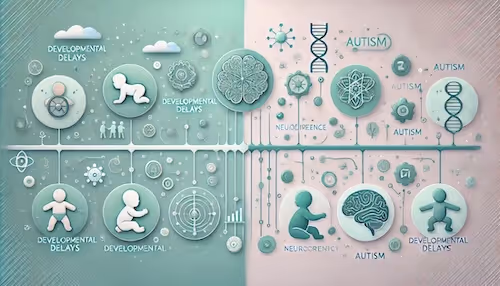Autism is a neurodevelopmental disorder that affects social communication and behavior. It has many symptoms, often including developmental delays. Developmental delays mean slower-than-average growth in one or more aspects, such as communication, cognitive skills, or emotional milestones. These are two separate conditions, and while their symptoms may overlap, they are not interchangeable.
In simpler terms, when children do not reach their developmental milestones at the expected pace, they are going through developmental delays. In autism, people may or may not experience developmental delays - nevertheless, developmental delays are only a symptom of autism and may not always occur in autistic individuals.
Developmental Delays vs Autism - Key Differences
As both of these conditions have similar symptoms, it is difficult to diagnose a child with either one of these initially. However, professional therapists can spot the differences required to diagnose accurately.
The table below shows some of the major differences between developmental delays and autism.
Similarities Between Autism and Developmental Delays
While these are two different conditions, they share some similarities. After all, there is a reason why people generally get confused between the two: they are alike in many ways. Here is a list of the similarities between developmental delays and autism:
- Can be genetic.
- Can be repressed or exacerbated by the surrounding environment.
- Presents challenges in social communication, social interactions, and speech and emotional regulation generally.
- Early intervention is of prime importance in both of these conditions
Should Autism be Diagnosed based on Developmental Delays?
The simple answer is no. This is because developmental delays can be subtle and go unrecognized for years - this doesn’t mean autism cannot be detected sooner. Autism can be diagnosed by a combination of various other symptoms.
It is an inaccurate assumption to assign developmental delays as the only or most characteristic symptom of autism. In a lot of cases, missed milestones are unnoticed or invisible in autistic people. This is because they are not just delayed, autistic people are neurodivergent - they are different from their peers in the way they learn, absorb information, or act.
Is Early Intervention Necessary for Both?
One irrefutable similarity between autism and developmental delay is that early intervention is important in both cases. Early intervention means getting a diagnosis as soon as possible and taking a proactive approach towards treatment and therapy.
In therapy sessions, autistic or delayed children are provided with tools designed to cater to their specific needs by professionals who are certified to teach them. Various strategies such as Applied Behaviors Analysis or Occupational Therapy can be implemented to manage autism or overcome developmental delays, so the sooner the child is enrolled in an intervention program, the higher the chances of them learning life skills at an early age and moving towards independence.
Conclusion
Developmental delays and autism often manifest themselves in similar ways but they are different conditions. Developmental delay means missing developmental milestones; it is temporary and often easily rectified. Autism, on the other hand, is a neurodevelopmental disorder that is a lifelong condition. People can learn to manage their symptoms or acquire skills to help them navigate life but they cannot completely cure ASD. However, in both situations, early intervention is necessary to maximize the chances of the autistic or delayed individual learning skills for independence and a better quality of life.


